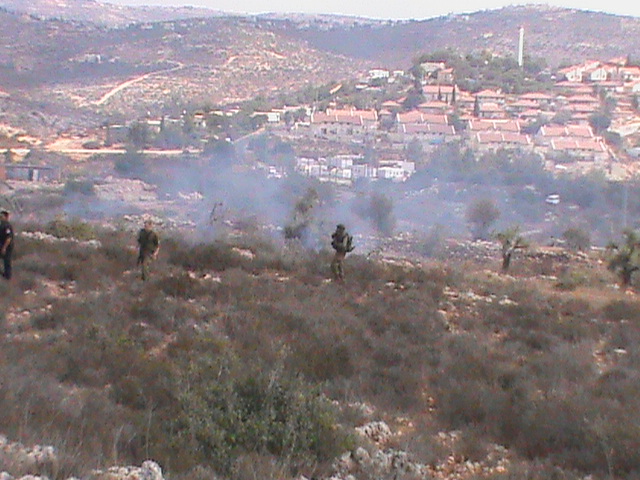Beitillu Village:
Beitillu is a village located to the northwest of Ramallah, 19 km from the city. Beitillu is bordered to the east by Birzeit and the farm village, Almazra'a and to the west by the Green Line. To the north it’s bordered by Nabi Saleh and to the south by Ras Karkar and Al-Janbeh. Beitillu contains about 103 water springs.
According to the administrative borders the village covers about 18000 acres; 5825 acres are irrigated areas, and 2,500 acres constitute olive groves. It has a population of 4500 people. The village is known for its cultivation of olives, almonds, figs and citrus fruits; and there are more than two thousand acres of land suitable for agriculture. According to the Oslo agreement 35% of village lands, which are very important for agriculture, are classified as area ''C''. Beitillu is located within the union municipality along with the villages of Jalamah and Deir Ammar.
Settlement Reality Surrounding the Village
The building of the “Nhlael” settlement began in the village of Beitillu in 1984 when 50 acres of land were confiscated from the eastern side of the village of Beitillu. The settlement then expanded gradually and along with other settlements surrounding the village, such as "Hallamish" which is located to the north of village and the settlements of "Nariyah" and "Dolph" to the south, a further 2,500 acres of land were confiscated. Thus, Beitillu is surrounded by settlements from all sides. The village witnesses expansive work on a daily basis, which includes bulldozing and confiscation of land for the surrounding settlements; in particular the "Nhlael” settlement.
Settlers' Attacks
618 olive trees were cut down by the settlers in the village during 2012, along with approximately 400 trees that have been burned. Many more have not been counted.
Like the majority of the Palestinian villages, which are exposed to settlers' terrorism and who are protected by occupation forces, the village of Beitillu is exposed to continuous attacks. Attacks are especially common from the "Nhlael" settlement, such as burning village houses and vehicles and beating farmers and residents. In addition to the cutting, burning and stealing of the crops from the olive trees, acts of sabotage on the irrigation pipes and equipment used by the people in the surrounding areas where water springs are found are common. Some of these areas have been transformed by residents into farmland to prevent settlers from getting it. Settlers are also prone to make up events and religious ceremonies in order to go to the springs and convert them into holy places.
Mustafa Badr owns 50 acres of olive trees, some of which are 60 years old. Bader says: "I had to reconstruct my land which cost $10000 after the settlers completely destroyed it, however, I will continue to visit my land for the rest of my life." The settlers are destroying and vandalizing any lands that the Palestinians have worked hard to take good care of. It is clear that today settlers are becoming more harmful and violent toward Palestinian citizens.

